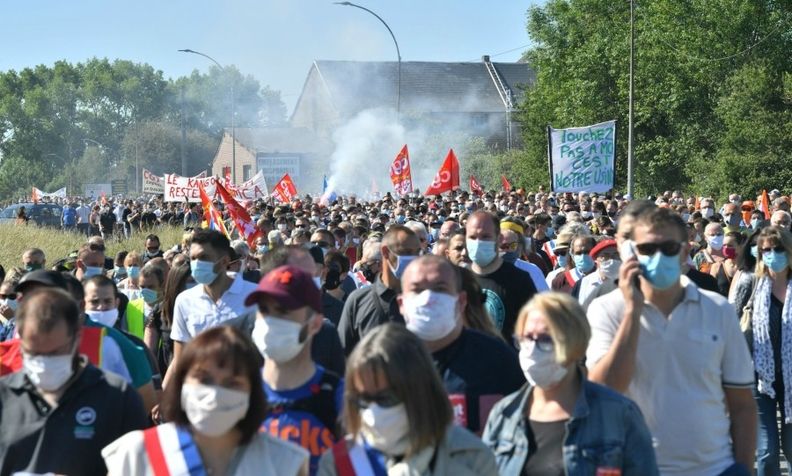PARIS -- Renault Chairman Jean-Dominique Senard sought to defuse a strike that erupted at a factory in northern France after the automaker announced a cost-cutting program, saying he was not planning to shut the site.
"I have no intention, in principle, to close the Maubeuge plant," he said in media interviews Sunday after thousands of employees and family members demonstrated outside the plant the previous day. "I can assure you, I never said that and I didn't even think that," he said.
Renault unveiled a sweeping plan on Friday to eliminate about 14,600 jobs worldwide and lower production capacity by almost a fifth to slash costs amid the global auto industry slump.
The plan includes trimming 4,600 positions in France, or about 10 percent of the automaker's total in its home country, through voluntary retirement and retraining. It sparked an outcry from labor unions.
Under the plan, Renault aims to consolidate the Maubeuge site's vehicle production with that of the nearby Douai plant.
The company, which is poised to get a state-guaranteed loan of as much as 5 billion euros ($5.6 billion), has come under intense pressure from the government to tread carefully with plans to downsize in France.
Finance Minister Bruno Le Maire, speaking in a separate interview, said that while plant "is not going to disappear," the company needs to become more competitive.
Talks with unions and local politicians on the future of Renault's northern sites are set to get underway on Tuesday after President Emmanuel Macron warned that any plan to combine activity at Maubeuge with Douai needs to be closely examined. The state is Renault's most powerful shareholder.
While promising on Sunday that no workers will be fired or left behind, Senard said the automaker remains "fragile" and that its significant overcapacity problems go well beyond the French plants and predate the coronavirus pandemic that has hammered the industry.
Years of expansion have left Renault with the capacity to make 5.5 million cars, when just 3.8 million were produced last year amid a "competitiveness gap" with other global automakers, he said.
Capacity in France stands at 1.8 million vehicles for output last year of 650,000.
"If we do nothing today, a certain number of sites, in this country in particular, are at risk," Senard said.
"We are too big everywhere," he said, with the northern French plants significantly underutilized.
Elsewhere in France, Senard said the Caudan (Fonderie de Bretagne) site in Brittany would likely be sold, while the Flins car assembly plant near Paris, which employs roughly 2,600 workers, would be transformed to specialize in recycling, repair and prototypes.
"Flins won't close," he said, adding the nearby operations at Choisy-le-Roi would be shut down and moved to the site.
Adding to the automaker's woes, the company in the past had resorted to selling cars too cheaply, according to Senard. Renault would guard against resorting to these practices in a bid to sell inventory that has accumulated in recent months during the pandemic, he said.
The automaker presented its cost-cutting plan just after partner Nissan announced its first loss in a decade and their alliance structure with Mitsubishi Motors unveiled measures for greater operational cooperation.
Senard dismissed talk of the alliance taking on more partners to consolidate the struggling industry, saying he preferred to work on making it more "attractive and confident."
Despite this, he reiterated the possibility that Renault could announce more developments in the coming months with shareholder Daimler.
